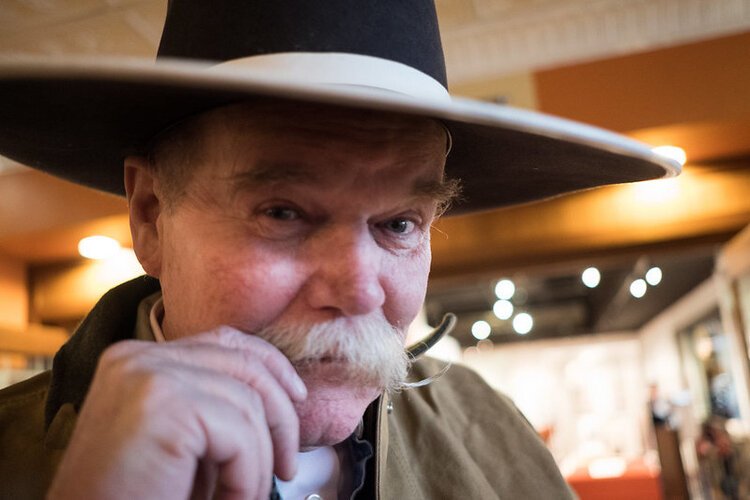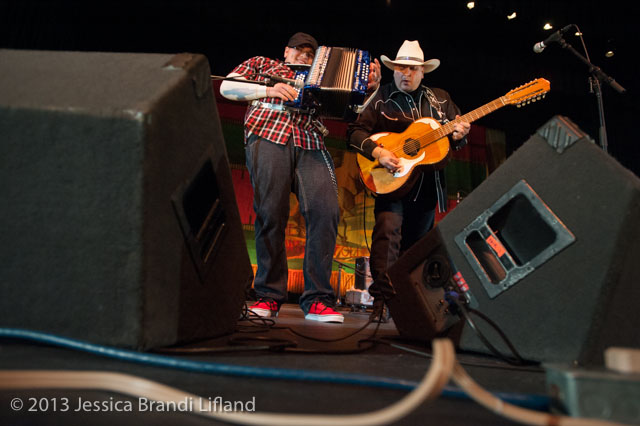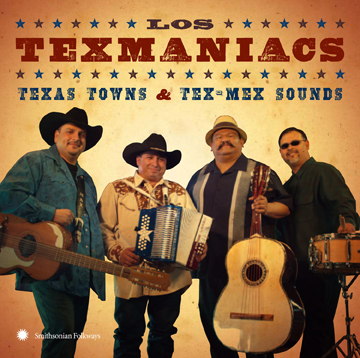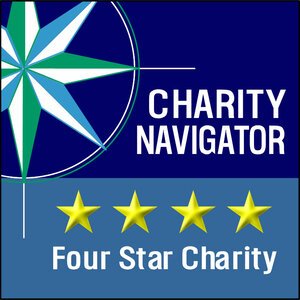29th National Cowboy Poetry Gathering, Saturday, Thursday 2, 2013
Early this morning artists, annual Gathering goers, and new comers came together in a round table discussion focused upon the National Cowboy Poetry Gathering's future. The group focused specifically upon the growth and success that we would like to see over the next few years.
Without filling the page with meeting minutes, I have taken the liberty of selecting a few topics from array of subjects that came to light as voices were heard and ideas were shared. The following is a bit of a jumble, and in some ways so was the meeting, so take what you want from it and let the rest wash over.
How's the Artist Selection? There was a resounding belief that the selection of artists has been well thought out and chosen by the Western Folklife Center's staff. And in addition to having artists that are fun to watch, this selection of artists does not see the Gathering as a focus upon them, but instead a focus upon the people that make up Western folk culture. (They are here to see friends and meet new people just like the rest of us). Simply put, the Gathering retains its roots.
With that said...
Are we an event based upon inclusivity or exclusivity? There was an emerging dichotomy regarding what audience the NCPG should be focusing upon; ranch families that make up much of the area West of the Mississippi or people from urban centers all over. The Gathering started in the late 70s and early 80s by bringing local ranch families together to share and enjoy art, music and poetry. Today, ranchers and other hard working people continue to set aside time in their lives to get off the ranch and head to Elko. The Gathering has experienced changes and lulls in attendance over the last few years that have caused enthusiasts to worry about its welfare (making this one of the most important topics to address).
Is this a Business or a Social Event? There are so many more fun events and strange happenings that many visitors either aren't aware of, or don't know occur. On any given evening you'll stumble across jam sessions, late night dance parties and even personal heroes. These are the parts of Western folklife that many find important. I for one, implore that each and every visitor sit down at a table filled with strangers or approach artists that you otherwise wouldn't, because this is exactly the right place to do it and we want to continue these traditions for years to come.
However...
The Western Folklife Center is not in the best position to support this event in the longterm without a good long look at how the business side of this event is related to its survival. Of course, much of these questions will need to be answered by Western Folklife staff.
How do we bring new people in? Word of mouth and bringing a friend to visit the Gathering is simply not cutting it anymore, and the importance of getting the NCPG community involved in welfare and growth was a recurring theme. As well as keeping in mind that the local community and people whom work so hard getting this event going each year have a vested interest in the Gathering's continuing success. If you are one of those people traveling hours or even days to get here, you're a part of an effort to get the NCPG moving forward. Getting involved with other events and forums in your hometown may be the way to assure that the Gathering remains in Elko over the next 29 years.
There is a question about whether we should focus our efforts on social media (such as Facebook, Youtube or even this blog site). Much of this boils down to what audience we would like to pull into Western folklife. Sure, kids use these technologies but western folklife is all about focusing on arts by getting your hands dirty and meeting people. Grass roots conversation is how all of this got started, perhaps there is a way to keep this part of the event in tact.
Is Our Focus Education or Entertainment? There is also a discrepancy with what age group we want to focus our efforts in developing the next generation of artist and visitors. Perhaps the "next generation" isn't what it seems (such as young children or teens) it could be college twenty somethings that are ripe for new experiences or single 30 somethings looking for something familiar. This is difficult to define, but is a critical question facing the Western Folklife Center and the people that love Elko.
In Conclusion. There is a fear that if we reach out too far, we will lose what makes the NCPG and Western Folklife special. Artists are open minded and forward thinking when comes to understanding that the social environment we live in today (and Elko itself) are changing entities. Perhaps, this year's success will bring together an array of new ideas that will help expand our future.
The NCPG is a truly amazing place, a place to meet family that you never knew you had. People from all walks of life are able to come down to Elko, making it a great place to not just see artists perform their craft, but also take the time to create friendships that last a lifetime.
The Western Folklife Center wants to know what you have to say, please leave comments below. Here are a few questions to ask yourself:
What is it that brings people to the NCPG year after year? Who is the target audience at the NCPG? How do we keep our community roots, while keeping a focus on entertainment/education?
Written by Mike Gamm
































